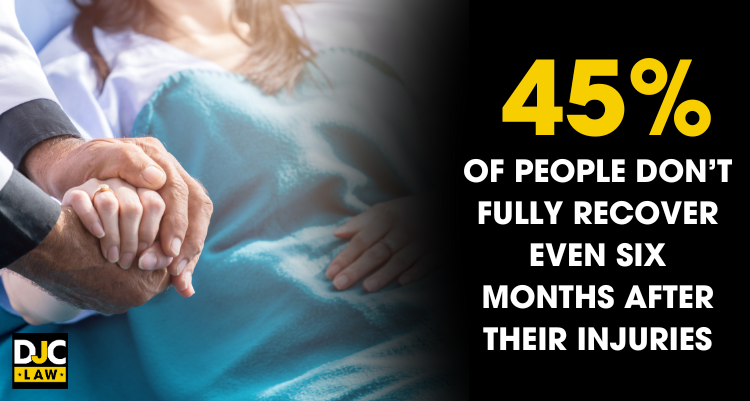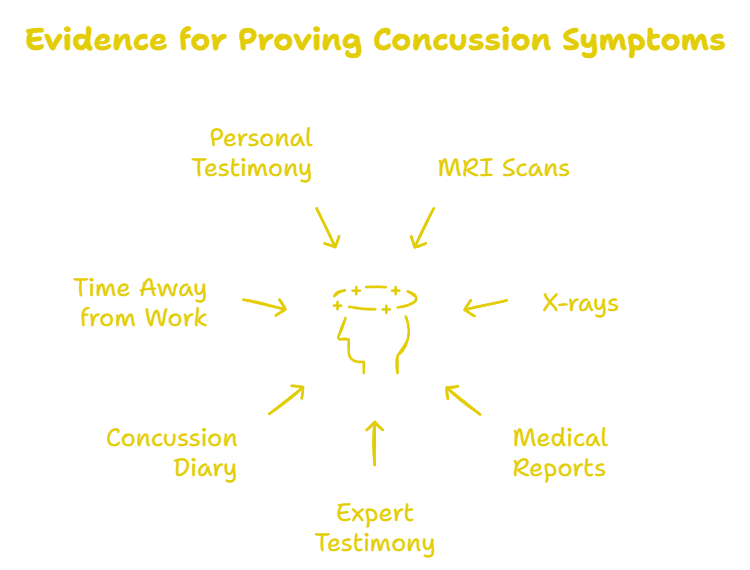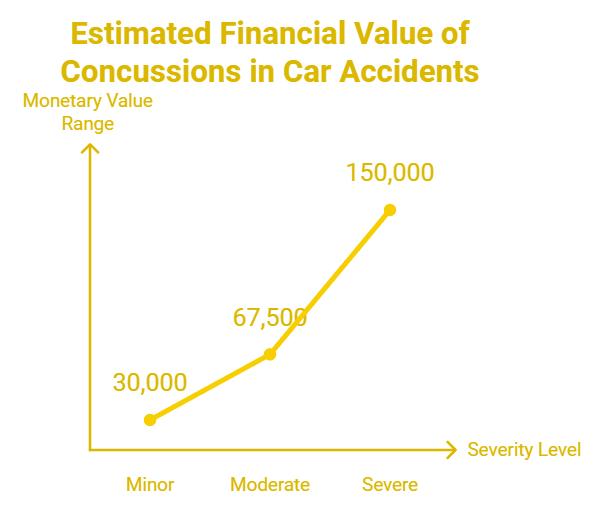
Concussions originate from the blunt force trauma to the head caused by the impact of car accidents. With the U.S. Centers for Disease Control (CDC) reporting 190 deaths daily from traumatic brain injuries, “getting your bell rung” isn’t something to dismiss or walk off. If your concussion was caused by someone else’s negligence, an Austin car accident lawyer can help you seek compensation and hold the responsible party accountable.
In the past, concussions haven’t been treated with the seriousness they deserve, particularly in sports. As we learn more about these injuries, however, we’re finally understanding how significant of an injury concussions are – and how remarkably common they are.
Today, we’ll discuss what to do if you have a concussion after a car accident, the signs of one, and what it could mean for your car accident injury claim.

Key Takeaways
-
Concussions are traumatic brain injuries that impact brain function. Most concussions are short-term but can become chronic problems when left untreated.
-
Most auto accident concussions are caused by the whipping motion of the head or the head colliding with an object in the vehicle, leading to the brain colliding with the inside of the skull.
-
All concussions are traumatic brain injuries and require immediate medical treatment. Visit your doctor as soon as possible if you detect any concussion symptoms.
-
The most common concussion symptoms include headaches, dizziness, nausea, trouble concentrating, and amnesia.
-
Most people will fully recover from concussions, but others experience chronic problems known as post-concussion syndrome.
-
You have a legal right to claim compensation if you were involved in an accident that wasn’t your fault and you sustained a severe head injury as a result.
-
Speak to a lawyer to begin building your case and maximize your settlement. They’ll gather evidence to establish liability, prove your symptoms, and negotiate a fair compensation package.
What is a Concussion?
Concussions are traumatic brain injuries impacting brain function. The effects are often short-term and may include headaches and difficulties with concentration and memory, but they can also result in chronic symptoms.
A concussion is caused by a blow to a person’s head or their body. Essentially, your brain connects with your skull. In terms of car accidents, concussions are often caused by either:
-
The whipping motion of the head as the body is forced forward upon your car, impacting another vehicle or object.
-
A direct blow to the head, such as an occupant’s head hitting the steering wheel, dashboard, or the seat in front.
According to the National Institutes of Health, between 1997 and 2010, 14.1% of all TBI-related hospitalizations involved car accident occupants. Not everyone who experiences a blow to the head or body will get a concussion, but many do.
One of the chief difficulties of dealing with concussion is how it varies in severity. Some people will lose consciousness for a few seconds or minutes because of a concussion, but many have no immediate symptoms at all.
Most people will fully recover after a concussion, but some people experience long-term symptoms. According to the University of Cambridge, 45% of people don’t fully recover even six months after their injuries.
Sadly, concussions can be fatal if they are severe enough. Although usually classified as mild traumatic brain injuries, they can lead to permanent loss of brain function. According to TreatNOW, car accidents are still the leading cause of all TBI-related deaths in children and young adults.

Types of Car Accident Concussions
Concussions after a car crash vary in severity. Medical professionals split them into three categories, known as grades, starting from mild and ending with severe. The severity of symptoms, treatment paths, and long-term effects all differ depending on which concussion you’re diagnosed with.
-
Mild Concussion (Grade 1) – Mild concussions will usually leave you with a headache, but you won’t lose consciousness. Symptoms may disappear in as little as 15 minutes but can also last a few days.
-
Moderate Concussion (Grade 2) – Moderate concussion symptoms last for around 30 minutes to a whole day, with the potential for lingering effects, like a headache that won’t go away. Patients can lose consciousness for up to five minutes.
-
Severe Concussion (Grade 3) – As the most serious of all concussions, car accident victims lose consciousness for up to five minutes or more. Symptoms can last for weeks, and patients are at risk of brain damage without prompt medical attention.
Regardless of the type of concussion, all concussions are serious and represent a significant brain injury. Seek medical attention for any form of head injury arising from your accident.
What are the Signs of Concussion from a Car Accident?
Concussion symptoms can be subtle and take days or weeks to develop fully. The most common symptoms include headaches, confusion, amnesia, and nausea. According to the University of Harvard, as many as 50% of concussions go unreported due to a lack of symptoms or misunderstood symptoms.
Let’s begin with the physical signs of concussions:
-
Headaches
-
Tinnitus (ringing in the ears)
-
Nausea/Vomiting
-
Fatigue
-
Drowsiness
-
Blurred vision
-
Dizziness
-
Amnesia
-
Confusion
It’s also important to remember that many people with concussion don’t realize they have a concussion, but others may notice something is off. For example, witnesses may find an accident victim slurring their words, delaying their responses, looking dazed, or being unusually forgetful.
Some symptoms may not appear at all for days or weeks. According to NYU Langone Health, in rare circumstances, some people with concussions have no symptoms for hours or days after concussions. Some of the symptoms notorious for taking time to emerge include:
-
Personality changes
-
Sleeping difficulties
-
Light and noise sensitivity
-
Difficulty concentrating
-
Trouble remembering things
-
Depression
-
Taste and smell changes
What are the Main Causes of Concussions in Car Accidents?
Concussions after a car accident are caused by a strike, blow, or jolt to your head. However, some concussions can occur even without an impact on the head if the crash is violent enough. The most basic cause of a concussion is the brain striking the inside of your skull.
Many concussions are caused by rear-end accidents because of the way force works. We can refer to Newton’s First Law of Motion for more information on this. An object that’s in motion is guaranteed to stay in motion until acted upon by some other force.
For example, if you’re hit from behind, your head will suddenly accelerate and then be brought to a sudden halt by either your seatbelt or colliding with another object. It’s this motion that forces the brain to move inside your skull. The danger is bruising or damage, such as internal bleeding.
If your brain starts bleeding, you could also fall victim to swelling, which puts further pressure on the brain. Without medical help, the damage could become permanent and result in life-altering disabilities.
Car Crash Concussion? What is Post-Concussion Syndrome (PCS)?
Concussion can also result in post-concussion syndrome after your accident. Not everyone will experience it, but the symptoms are associated with previous head injuries, younger age, and a history of headaches. Although poorly understood, PCS is a legitimate condition that could impact your recovery.
According to the National Institutes of Health, 90% of concussion symptoms will resolve themselves within ten to 14 days. Unfortunately, the same can’t be said for everyone who gets a concussion from their accident.
In another National Institutes of Health study, 48.3% of patients said they still retained at least one symptom of post-concussion symptom one year after their injury. Some patients will never see their symptoms dissipate, whereas others could spend years waiting for relief.
Symptoms of PCS are vague and may be linked with other injuries. Diagnosing it is complex, which is why doctors typically focus on reported symptoms and the history of head injury. You’ll also note that symptoms are often identical to concussions, including:
-
Headaches
-
Dizziness
-
Nausea
-
Depression
-
Difficulty concentrating
-
Amnesia
Likewise, treatment options are limited. Other than immediate symptom relief, most people see their symptoms dissipate by reducing stress in their lives and the passage of time. If you have post-concussion syndrome, this could influence your claim, enabling you to pursue a larger settlement.
How Long Does a Concussion Last After a Car Accident?
Concussions are usually temporary, and most people make a full recovery. The National Dizzy & Balance Center reveals that most concussions resolve in a few weeks. Some people may experience issues for months or years afterward.
All forms of head trauma must be taken extremely seriously. Although the prognosis for most people is good, and they can go back to their regular schedules quickly, concussions can result in permanent damage.
If you’ve suffered a concussion in the past, you’re at greater risk of severe symptoms, and you’ll probably take longer to recover. You’re also at greater risk of developing post-concussive syndrome, which can impact every aspect of your life.
Note that if you’re already recovering from a head injury, even a mild concussion from your motor vehicle collision could result in chronic symptoms. According to Beaumont Health, this is known as Second Impact Syndrome (SIS), and it’s characterized by the brain swelling rapidly after getting a second concussion before recovering from your first one.
What to Do If You Hit Your Head in a Car Accident
Ensuring your health and safety is your priority after a car accident. Seek immediate medical attention at your nearest medical facility and work with your doctor. If you try to “tough it out,” you risk causing permanent damage and life-changing disability.
Here’s what to do after hitting your head in a car accident.
Seek Medical Attention Immediately
Head injuries can quickly turn from nothing into something. Getting checked out as fast as possible is critical for ruling out any serious issues, such as brain bleeds.
Your symptoms may not appear for a few hours, but just because there are no symptoms doesn’t mean there’s no damage. Your doctor can run MRIs, x-rays, and other tests to check for concussion.
Listen to Your Doctor
Your doctor knows best, so follow their instruction. They’ll often prescribe medication and mandate rest and avoiding strenuous activities. Following their instructions is important not just for your health but also for your claim.
If you didn’t follow your doctor’s instructions, it gives rise to your own insurance company arguing that you made your injuries worse or your injuries weren’t as severe as you tried to claim.
Monitor Symptoms for Traumatic Brain Injury
Concussion symptoms are notorious for not showing up until days or weeks after your accident. If you believe you might have suffered a concussion, watch your symptoms the whole time. Even if you’ve already been diagnosed, you must watch your symptoms.
Alongside looking up the most common concussion and post-concussive symptoms, look out for symptoms that get worse. If your symptoms worsen or you develop other symptoms, visit the emergency room immediately.
What are Your Legal Rights if You Suffer a Head Injury from a Car Accident?
Head injuries are like any other injury in that they can form part of your personal injury lawsuit or insurance claim. Your personal injury attorney will liaise with your medical team to establish the extent of your head injuries and their impact on your total case value.
Anyone who has sustained injuries or losses due to another party’s negligence is entitled to compensation. You can claim for tangible losses, like your medical expenses, and non-tangible losses, such as pain and suffering.
Head injuries fall into both these categories. The caveat is that you must prove that:
-
The other driver had a duty of care.
-
The other driver’s actions or inactions violated that duty of care.
-
You sustained losses.
-
The other driver’s actions or inactions caused those losses.
Remember, if you live in an at-fault state with comparative negligence laws, you may receive a reduced settlement amount for your head injuries if you’re assigned part of the blame. Moreover, states like Texas and Illinois mandate that if you’re more than 50% responsible for an accident, you can’t claim any monetary compensation at all.
Understanding Liability in Car Accident Concussions
Liability for car accident concussions is evidence-based, meaning you must demonstrate that the other driver caused your losses through their negligent behavior. Gathering as much evidence as possible will demonstrate that the other driver was at fault for your head injuries.
Examples of evidence that can be used to prove liability include:
-
Obtaining an official accident report from a police officer.
-
Proving that the other driver violated traffic laws.
-
Getting surveillance camera footage.
-
Getting eyewitnesses to provide official statements.
-
Calling in accident reconstructionists.
-
Photographs or videos of the accident scene.
You’ll also be expected to provide your medical records to prove that you didn’t already have a concussion before your car accident. For example, if you like to play beer league hockey and you got a concussion earlier that week and then got into an accident, the other driver’s insurer might argue that your concussion was a pre-existing condition.
Establishing who was to blame for an accident and your concussion requires an experienced lawyer who can piece together the evidence and build your case.
How to Prove Concussion Symptoms in a Legal Case

Proving concussion symptoms relies on producing ample medical evidence to demonstrate your symptoms. Unlike a visible injury like a laceration or broken bone, proving the extent is more complex, and you’ll likely receive opposition from your auto insurance company.
Types of evidence that can prove your concussion symptoms include:
-
MRI scans
-
X-rays
-
Medical reports
-
Expert testimony from your doctor or therapist
-
Producing a concussion diary
-
Time away from work
-
Testimony from those closest to you
Concussion severity varies wildly, which makes proving symptoms so tricky. It often relies on a mixture of witness testimony and medical evidence to comprehensively prove not only your symptoms but how serious they are and the impact they’ve had on your life.
When to Consult a Personal Injury Lawyer for Your Head Injuries
Consulting a personal injury lawyer should happen as soon as possible after your car accident. Getting started on your case is critical for gathering and preserving evidence while it’s fresh and avoiding the dirty tricks insurers might employ to get you to admit fault or downplay your injuries.
Your concussion injury lawyer takes control of your case and gives you the time and space you need to follow your treatment plan and recover from your head injuries. Moreover, they’re experts in collecting evidence and bringing it together to build a strong case that maximizes your settlement.
Additionally, consulting a car accident attorney as soon as possible ensures you don’t fall victim to the statute of limitations. Each state has a specific statute of limitations on filing personal injury claims.
For example, you have two years to file your case in Texas. If you don’t lodge your claim in time, you’ll lose the right to claim a settlement for your head injuries, regardless of who was at fault.
Compensation Types Available for Concussion Injuries
Concussion injuries result in tangible and non-tangible losses. Accident victims can claim various losses, such as current and future medical bills and lost wages, because of time away from work. Additionally, they can claim for their pain and suffering and losses like the loss of enjoyment of life, like if you’re unable to partake in your favorite hobbies anymore.
Here are some of the compensation types you could be eligible for:
-
Doctor’s visits
-
Therapy costs
-
MRI/X-ray costs
-
Lost salary
-
Lost earnings potential
-
Wrongful death
-
Pain and suffering
-
Loss of companionship
-
Loss of enjoyment of life
Working with a lawyer ensures that you explore every avenue. It’s one reason why plaintiffs who work with an attorney claim far bigger settlements than those who attempt to file and fight a lawsuit alone.
How Much is a Concussion Worth in a Car Accident?

Average settlements for concussions depend on the severity of your concussion. Settlement payouts are also heavily influenced by extenuating circumstances, such as other injuries the plaintiff might have and any lingering symptoms.
Every law firm will provide different estimates of what a concussion could be worth, but here’s a rundown:
-
Minor – $20,000-$40,000
-
Moderate – $50,000-$85,000
-
Severe – $150,000+
Take all estimated settlement values with a chunk of salt. So many factors go into putting a dollar value on a concussion lawsuit after an auto accident. The best way to discover how much your concussion could translate to when filing a lawsuit is to consult an attorney and let them assess your case’s value.
Car Accident Concussions FAQs
Do you recover 100% from a concussion?
Most people fully recover from concussions after an auto accident. Some people may find themselves developing post-concussion syndrome, where their recovery takes longer than expected. In rare cases, symptoms remain permanent and life-long. Even those with chronic symptoms can minimize the impact their concussion has on their lives.
Can I sleep with a concussion?
Yes, you can sleep with a concussion. You won’t slip into a coma and die if you fall asleep after a concussion. Although the myth is that you should stay awake for at least six hours after a concussion, if you can hold a conversation, there’s no reason why you shouldn’t go to sleep.
Going to sleep is often the best way to begin your recovery. Sleeping enables your body to unleash its full healing capabilities. It’s why doctors always prescribe rest when recovering from any form of concussion.
When should I file a lawsuit for a mild traumatic brain injury?
Work with your lawyer to determine when to file your lawsuit. They can advise you on whether to accept a settlement from your auto insurance firm or file a lawsuit for your head injuries. Be mindful of the statute of limitations in your state because if you miss it, you risk losing your right to claim monetary compensation entirely.



